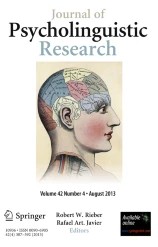A journal has retracted 16 papers after a whistleblower flagged it for “irregularities” in peer review, among other concerns.
The Journal of Psycholinguistic Research, a Springer Nature title, published the papers between 2021 and 2024. The articles covered research ranging from studies of the work of Haruki Murakami and Kazakh literature to English reading fluency and the teaching competence of parents of children with cochlear implants.
Thirteen of the 16 articles have been cited one to five times, according to Clarivate’s Web of Science; one article has been cited 19 times, the highest of the bunch.
The retraction notices, dated April 10, 2025, read in part:
An investigation by the Publisher has found a number of articles, including this one, which share similar concerns, involving but not limited to, irregularities with respect to authorship, ethics approval and peer review. The Editor-in-Chief therefore no longer has confidence in the results and conclusions presented in this article.
Many of the authors of the retracted papers are affiliated with institutions in Iran, China and Kazakhstan. At least two of the authors object to the retractions.
“Following contact from a whistleblower, Springer Nature’s Research Integrity Group undertook an investigation of a number of papers of concern,” Svetlana Kleiner, a research integrity manager at Springer Nature, told Retraction Watch. The publisher looked into each of the papers and presented its findings to the journal’s editor, “leading to a number of retractions,” Kleiner said.
The whistleblower, Anna Abalkina, a research fellow at Freie Universität Berlin in Germany and creator of the Retraction Watch Hijacked Journal Checker, told us she uncovered problems when she examined fake peer reviewer profiles in Clarivate’s Web of Science. These profiles were created by a paper mill, and one of them had been associated with the peer review for the Journal of Psycholinguistic Research, so Abalkina informed the journal about the issue last year.
Dorothy Bishop, a sleuth and professor of developmental neuropsychology at Oxford University, raised issues about the journal on her blog in October 2024. In the post, she wrote about how the journal appeared to be the target of Eastern European paper mills, and that other journals found to have published paper mill papers used fake peer reviewers.
Springer Nature has had to issue mass retractions before for peer review manipulation, including using fake peer reviewers.
Ehsan Namaziandost, a coauthor on three of the articles and a former academic at the Mehrarvand Institute of Technology in Iran, told us he disagrees with the retractions.
“I did not commit any misconduct at any stage of the publication process. From the initial submission through to final publication, all procedures were overseen and approved by the journal’s editorial team, including the Editor-in-Chief, who made the final decisions following multiple rounds of peer review — sometimes up to five rounds,” he wrote in an email.
Namazandiost said “the responsibility for selecting reviewers and making final decisions lies entirely with the Editor-in-Chief and the Associate Editors—not with the authors. Authors do not manage or influence peer review in any way.”
According to the journal’s submission guidelines, authors “are welcome to suggest suitable reviewers,” along with an institutional email address or “other means of verifying the identity” of the reviewer. The guidelines note the journal may not use suggested reviewers, “but suggestions are appreciated and may help facilitate the peer review process,” the guidelines state.
Irina Karabulatova, of the Peoples Friendship University of Russia in Moscow and an author on one of the retracted papers, said the journal notified her “a new review was allegedly underway to make sure that the reviewers to whom the journal had once sent my article for review would confirm that they had indeed reviewed it,” she said by email. The journal didn’t receive a response, she said, and so retracted her paper.
“I consider this attitude of the magazine to be the height of hypocrisy: to take an article and make money from it, and then publicly withdraw it a few years later for a far-fetched reason, destroying reputational capital – this is the height of hypocrisy, which negates the significance scientific publications,” she said.
Kleiner would not provide details of the peer reviews in this case, citing confidentiality, but said they “can confirm that [the issues with peer review] were sufficient to call into question the robustness of the process.”
In 2024, Springer Nature retracted 2,923 articles. Last month, Oncogene, one of the publisher’s titles, retracted 15 articles by cancer researcher Jasti Rao.
Like Retraction Watch? You can make a tax-deductible contribution to support our work, follow us on X or Bluesky, like us on Facebook, follow us on LinkedIn, add us to your RSS reader, or subscribe to our daily digest. If you find a retraction that’s not in our database, you can let us know here. For comments or feedback, email us at [email protected].

https://pubpeer.com/search?q=authors%3A+%22Namaziandost%22